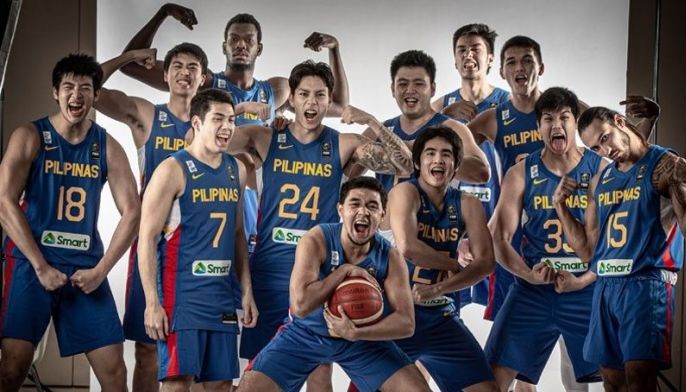MANILA, Philippines – The Philippines ended its bid to advance to the next stage of the FIBA Tokyo Olympic Qualifiers with a 67-94 loss to the Dominican Republic.
The young Filipino squad gamely battled the Dominicans until a third quarter breakaway put the game out of reach.
Despite finishing at 0-2 (including a 76-83 loss to Serbia on opening day), there is a marked sense of pride given the journey toward Serbia where the Olympic Qualifiers were held. So much unlike the way the 2016 Olympic Qualifiers ended. More on that later.
For one, Gilas swept their FIBA Asia Qualifiers campaign, 6-0, including two wins against Korea, to book a slot in the 2021 FIBA Asia Cup.
And second, the Philippines was in the game against Serbia until the closing stages when Boban Marjanovic went to work.
Nevertheless, it was a valiant stand and the Philippines can hold its head up high.
This is so unlike the way the 2016 OQT ended where Tab Baldwin was also the head coach. As host nation with the tournament held in Manila, the Nationals took losses to France, 84-93, and to New Zealand, 80-89, and was bounced from the tournament.
After that, Baldwin was removed as head coach.
Incidentally, that team was coming off a silver medal finish in the 2015 FIBA Asia Cup where it bounced back from an opening day loss to defeat some tough foes, including Iran, and only lost to China because of contentious officiating.
Furthermore, that team of Baldwin’s lost by far fewer points in the OQT.
So what is the difference?
If you ask me, it is the weight of expectations (well you can throw in some other behind-the-scenes stuff after the 2016 OQT).
There were high expectations following the back-to-back FIBA Asia Cup silver medal finishes of 2013 and 2015.
And a foot in the Olympics was the dream. Even if we didn’t win a game. Just getting back was going to be a huge feather in the cap.
It was an opportunity.
When the Philippines played France, they didn’t have all their best players. They only had three NBA players in Tony Parker, Boris Diaw and Jeoffrey Lauvergne. Nicolas Batum arrived late and missed the game, and Rudy Gobert missed the qualifiers (but played in the Rio Olympics). Evan Fournier, Rodrigue Beaubois and Alexis Ajinca skipped both the Qualifiers and the Olympics.
There was griping post-game that maybe the Philippines should have chosen New Zealand to be their first opponent (the host team had the opportunity to pick their opening opponent). The thinking was maybe the home team can jump on France on opening night. And it looked good except that France played team ball and was the model of calm and efficiency. And Nando de Colo, the tournament MVP, and Parker killed the Philippines with precision and execution.
If you ask me, the choice they made was a calculated risk. If there is second guessing about that well, hindsight is 20/20.
The second game — a must-win situation — saw the Philippines take on Baldwin’s old team, New Zealand, that was coached by his former players Paul Henare and Pero Cameron.
The Philippines led once, 17-15, but New Zealand took over and maintained their lead and constantly repelled the sorties of the home team.
There were expectations of beating New Zealand and I wrote about it at that time thinking that those thoughts were misplaced. I recall also talking to FIBA officials who felt many Filipinos did not think highly of New Zealand (considering they didn’t win much before the OQT). I thought the Kiwis were good and they were going to play well.
Since 2004, New Zealand has defied odds to win big games and finish well. And now, they are even sending players to the NBA.
If you are going to point out that New Zealand wasn’t doing well in the lead-up to the OQT, let me tell you something. The Azkals team that headed into the 2010 Suzuki Cup took one beating after another (including a 13-1 hiding by Bangkok Glass) but come the main tourney finished with a semifinals berth; its best ever at that point.
So a poor or good lead-up doesn’t begin to tell how a team will fare. Games and fortunes can turn on a head or with one play that can spell the difference.
And maybe it was the expectations that hurt.
Does that mean there were no expectations in the 2021 FIBA Asia Qualifiers and the OQT?
There will always be. Always.
Young team or not, you bounce out of the FIBA Asia, it won’t look good. Basketball, after all, is the national sport.
It would have been nice to make the Olympics this time considering by next year, it will be 50 years since a Filipino squad played in the Summer Games.
I would like to say that we stick with what program we have now. Give it time and not let the weight of return of investment or expectations bog it down.
Give Tab Baldwin time.
Give him time in the manner Germany gave it to Joachim Low with their football national team until recently when it is obvious that massive changes need to be made.
Give him the latitude in the manner that Dusan Ivkovic was given to the Yugoslavian (then later Serbian teams) from 1987-95.
Nothing is won overnight. I think the weight of unrealistic expectations can hurt and fast-track a process that shouldn’t in the first place.
For now, we should be proud and happy, but also not rest on these laurels because there’s the 2021 FIBA Asia Cup coming up on August 17.


